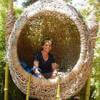We're continuing to have insightful conversations with pioneering conservation technologists from across East Africa as part of the first season of our InConversation Series (view past episodes here)! The same question keeps getting raised: how to get started in a conservation technology career? This question has motivated this exciting episode, where we sat down with Vainess Laizer, an exceptional young vulture researcher based in Tanzania, who began her journey in tech4wildlife in 2020 as part of her Masters program at Sokoine University of Agriculture under the RISE Scholarship through Grumeti Fund. Her unique journey navigating the conservation tech space provide wisdom and inspiration to anyone interested in a conservation tech career!
Vainess Laizer
It is important to mention that Vainess served as an excellent trainer and mentor during the second annual Women in Conservation Technology Programme in Tanzania in 2023 (you can read more about this here). During the programme, she led key training sessions on tech tools such as an Intro to Kobo and narrated her experience navigating conservation tech as a woman in Tanzania.
Photo Credit: Stephanie O'Donnell
Vainess's research focuses on:
- Investigating the breeding success of white-backed vultures in the western corridor of the Serengeti ecosystem.
- Using camera technology to look at nest contents and, in the future, using camera traps to explain nest failures.
Vulture research is crucial to the Serengeti ecosystem because of the role they (vultures) play in maintaining the ecosystem health by cleaning the carcasses.
-Vainess Laizer
Photo Credit: Vainess Laizer
_____________________
Listen in on our exclusive interview with Vainess Laizer, as we explore how to get started in a conservation technology career.
If we want to think about solving the ecological challenges we face in the conservation sector, we need to evolve with technology. As long as our research questions are answered we should focus on the solution it provides.
-Vainess Laizer
_____________________
Tell us about yourself?
I am a young conservationist and junior vulture researcher in Tanzania. My BSc is on Wildlife Tourism. I started volunteering at Tanzania Wildlife Research Institute (TAWIRI) for a year before I went to try and be a safari guide which to me was an exciting and challenging path to follow because of how the industry is male dominated, as well as having few mentors ready to guide me. I then realized what really inspired and made me happy professionally - research. So, I had to look for opportunities for scholarships to do my MSc and start a research career. That's how I landed in the Women in the Field (WIF) training through Grumeti Fund in 2019 and later on a scholarship for my MSc at Sokoine University of Agriculture doing vulture research in collaboration with NC zoo. Women in the Field program introduced me to a community of female scientists ready to help and mentor young scientists in wildlife research and academics. I don't enjoy anything other than being in the bush haha, I also love cooking and spending my time with kids. Oh yes, I'm out going too.
What motivated you to pursue a career in conservation technology?
As explained, through WIF, I was introduced to a community of female scientists that helped me to design my MSc study. I also met people that introduced me to the technology that can answer my research questions. A particular raptor researcher in the Mara, Kenya together with my team at NC zoo and RISE helped me to learn about the simple camera technology to study nesting of vultures in my study area.
Photo Credit: Vainess Laizer
Could you talk us through a brief summary of your work and the technology you use?
My MSc research which is now expanding to a PhD study is based on vulture nesting activities. With the ongoing decline of vultures it is important to monitor their breeding activities and recording their nesting characteristics. We use a go pro camera that is attached to a telescoping camera to get the photos of the nest content during the breeding season (eggs, chicks, sometimes empty). We also use remote sensing techniques to look at the tree cover changes in the nesting areas.
What challenges have you faced in getting started in this work, either with technology or otherwise?
Working with gadgets is crazy, one time I had my kobo server crash and that was in the beginning of my MSc surveys. I have had battery and camera failure over time as well as delays in purchase of some devices. All these can be solved by early planning etc. Challenges of permits and weather, terrains also come along the way.
Are there lessons from your journey so far that other young emerging/prospective conservation technologists could apply to their own career/professional journey?
I think one of the best lessons I have learnt is that you can never do it alone. You need to know and learn what others have done similarly to you and how best you can adapt and or not modify the methods. Again, since technology also evolves with newer innovations it is important to see what works for you depending on your resources.
For those needing to begin a career in conservation technology, always seek advice from those ahead otherwise you will be wasting a lot of resources and not being able to answer and solve the challenges. And technology being an expensive part to navigate it may need a team and donors sometimes do their best to focus on groups that do similar activities to you.
What advice do you have for the many young people across East Africa and the WILDLABS network thinking about getting started in conservation tech as a green career?
WILDLABS is a place to begin where people with different research questions look for opinions and help for their work. I mean collaborations are the best way to do it.
_____________________
Explore the links below to learn more about Vainess and her associated institutions:
If you'd like to get in touch with Vainess, click here.
In the meantime, stay tuned to meet more pioneering conservation technologists from across East Africa and learn more about East African projects powered by conservation tech!
Thanks to Vainess Laizer for talking with us, sharing photos and details with the WILDLABS community!







Add the first post in this thread.